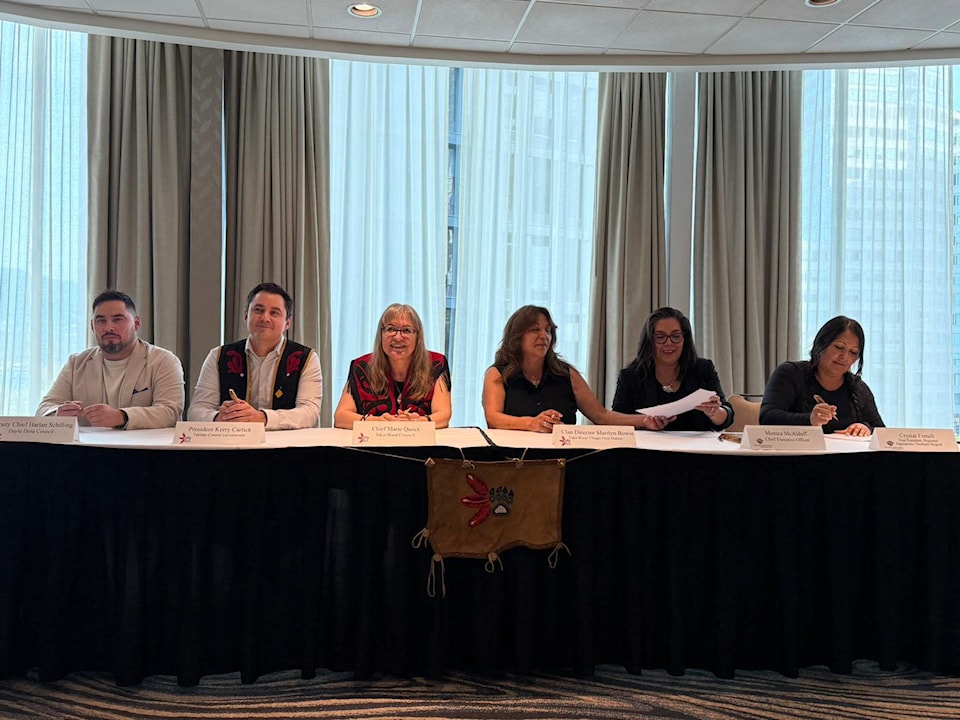Health
3Nations Society and FNHA Sign Historic MOU to Enhance Health Services

Indigenous communities in northwestern British Columbia may soon experience significant improvements in healthcare access due to a newly signed agreement between the 3Nations Society and the First Nations Health Authority (FNHA). The Memorandum of Understanding (MOU), formalized in Vancouver on September 19, 2023, lays the groundwork for a collaborative effort to enhance health service delivery across the territories of the Tahltan, Kaska, and Taku River Tlingit Nations.
The agreement emphasizes the recruitment and retention of healthcare workers in these remote areas. It aims to establish a comprehensive 3Nations Health and Wellness Agreement and secure sustainable resources for effective implementation. A key component of the MOU includes an annual report to monitor progress, specifically comparing life expectancy rates between First Nations and non-Indigenous populations.
Kerry Carlick, president of the Tahltan Central Government, expressed optimism regarding the partnership. “I am eager for our future collaboration with FNHA and other health system stakeholders to revolutionize healthcare access for individuals in the 3 Nations collective territories,” she stated during the signing ceremony.
Addressing Regional Health Disparities
Monica McAlduff, CEO of FNHA, reinforced the authority’s commitment to supporting community-driven approaches aimed at improving access to timely and culturally safe healthcare services. The 3Nations Society operates as a community-led coalition focused on addressing shared health priorities across its territory, which encompasses 24 percent of British Columbia. This region includes the communities of Atlin, Lower Post, Good Hope Lake, Dease Lake, Telegraph Creek, Iskut, and Fort Ware.
For the Taku River Tlingit First Nation, this agreement also opens avenues to tackle the jurisdictional challenges that have historically hindered effective healthcare delivery. Charmaine Thom, a spokesperson for the nation, highlighted the complications arising from overlapping health systems in British Columbia and Yukon. “It is a good first step to addressing inequalities that we experience in primary care, mental health, and access to mobile and virtual healthcare services,” she noted.
Long-term Vision for Health Improvement
The MOU aligns with the 10-Year Strategy on the Social Determinants of Health, which focuses on addressing the underlying causes of health disparities and enhancing wellness for First Nations individuals, families, and communities. Deputy Chief Harlan Schilling of the Daylu Dena Council emphasized the connection between wellness and cultural identity. “Our Nations have always known that true wellness is rooted in our lands, languages, and ways of life,” he remarked. “This MOU is a step forward to reclaiming our responsibility to care for our people in a way that reflects who we are.”
By fostering collaboration among the nations and stakeholders, the MOU aims to strengthen sovereignty and amplify community voices. The initiative seeks to create a healthcare system that serves Indigenous communities with dignity, respect, and cultural integrity, marking a significant advancement in health equity in northwestern British Columbia.
-

 Science3 months ago
Science3 months agoToyoake City Proposes Daily Two-Hour Smartphone Use Limit
-

 Top Stories3 months ago
Top Stories3 months agoPedestrian Fatally Injured in Esquimalt Collision on August 14
-

 Health3 months ago
Health3 months agoB.C. Review Reveals Urgent Need for Rare-Disease Drug Reforms
-

 Technology3 months ago
Technology3 months agoDark Adventure Game “Bye Sweet Carole” Set for October Release
-

 World3 months ago
World3 months agoJimmy Lai’s Defense Challenges Charges Under National Security Law
-

 Lifestyle3 months ago
Lifestyle3 months agoVictoria’s Pop-Up Shop Shines Light on B.C.’s Wolf Cull
-

 Technology3 months ago
Technology3 months agoKonami Revives Iconic Metal Gear Solid Delta Ahead of Release
-

 Technology3 months ago
Technology3 months agoApple Expands Self-Service Repair Program to Canada
-

 Technology3 months ago
Technology3 months agoSnapmaker U1 Color 3D Printer Redefines Speed and Sustainability
-

 Technology3 months ago
Technology3 months agoAION Folding Knife: Redefining EDC Design with Premium Materials
-

 Business3 months ago
Business3 months agoGordon Murray Automotive Unveils S1 LM and Le Mans GTR at Monterey
-

 Technology3 months ago
Technology3 months agoSolve Today’s Wordle Challenge: Hints and Answer for August 19









